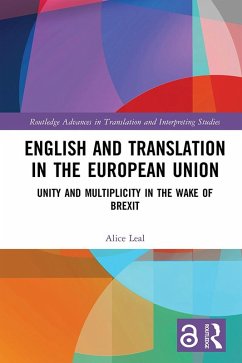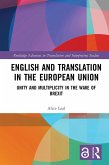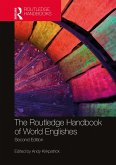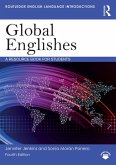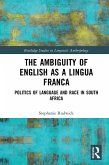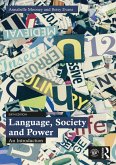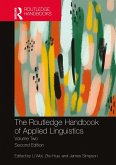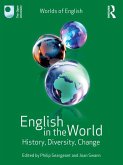Alice Leal
English and Translation in the European Union (eBook, PDF)
Unity and Multiplicity in the Wake of Brexit
0,00 €
0,00 €
inkl. MwSt.
Sofort per Download lieferbar

0 °P sammeln
0,00 €
Als Download kaufen

0,00 €
inkl. MwSt.
Sofort per Download lieferbar

0 °P sammeln
Jetzt verschenken
Alle Infos zum eBook verschenken
0,00 €
inkl. MwSt.
Sofort per Download lieferbar
Alle Infos zum eBook verschenken

0 °P sammeln
Alice Leal
English and Translation in the European Union (eBook, PDF)
Unity and Multiplicity in the Wake of Brexit
- Format: PDF
- Merkliste
- Auf die Merkliste
- Bewerten Bewerten
- Teilen
- Produkt teilen
- Produkterinnerung
- Produkterinnerung

Bitte loggen Sie sich zunächst in Ihr Kundenkonto ein oder registrieren Sie sich bei
bücher.de, um das eBook-Abo tolino select nutzen zu können.
Hier können Sie sich einloggen
Hier können Sie sich einloggen
Sie sind bereits eingeloggt. Klicken Sie auf 2. tolino select Abo, um fortzufahren.

Bitte loggen Sie sich zunächst in Ihr Kundenkonto ein oder registrieren Sie sich bei bücher.de, um das eBook-Abo tolino select nutzen zu können.
This book explores the growing tension between multilingualism and monolingualism in the European Union in the wake of Brexit, underpinned by the interplay between the rise of English as a lingua franca and the low status of translations in EU bodies, agencies and institutions.
- Geräte: PC
- ohne Kopierschutz
- eBook Hilfe
- Größe: 2.37MB
Andere Kunden interessierten sich auch für
![English and Translation in the European Union (eBook, ePUB) English and Translation in the European Union (eBook, ePUB)]() Alice LealEnglish and Translation in the European Union (eBook, ePUB)0,00 €
Alice LealEnglish and Translation in the European Union (eBook, ePUB)0,00 €![The Routledge Handbook of World Englishes (eBook, PDF) The Routledge Handbook of World Englishes (eBook, PDF)]() The Routledge Handbook of World Englishes (eBook, PDF)46,95 €
The Routledge Handbook of World Englishes (eBook, PDF)46,95 €![Global Englishes (eBook, PDF) Global Englishes (eBook, PDF)]() Jennifer JenkinsGlobal Englishes (eBook, PDF)39,95 €
Jennifer JenkinsGlobal Englishes (eBook, PDF)39,95 €![The Ambiguity of English as a Lingua Franca (eBook, PDF) The Ambiguity of English as a Lingua Franca (eBook, PDF)]() Stephanie RudwickThe Ambiguity of English as a Lingua Franca (eBook, PDF)42,95 €
Stephanie RudwickThe Ambiguity of English as a Lingua Franca (eBook, PDF)42,95 €![Language, Society and Power (eBook, PDF) Language, Society and Power (eBook, PDF)]() Annabelle MooneyLanguage, Society and Power (eBook, PDF)31,95 €
Annabelle MooneyLanguage, Society and Power (eBook, PDF)31,95 €![The Routledge Handbook of Applied Linguistics (eBook, PDF) The Routledge Handbook of Applied Linguistics (eBook, PDF)]() The Routledge Handbook of Applied Linguistics (eBook, PDF)46,95 €
The Routledge Handbook of Applied Linguistics (eBook, PDF)46,95 €![English in the World (eBook, PDF) English in the World (eBook, PDF)]() English in the World (eBook, PDF)42,95 €
English in the World (eBook, PDF)42,95 €-
-
-
This book explores the growing tension between multilingualism and monolingualism in the European Union in the wake of Brexit, underpinned by the interplay between the rise of English as a lingua franca and the low status of translations in EU bodies, agencies and institutions.
Dieser Download kann aus rechtlichen Gründen nur mit Rechnungsadresse in A, B, BG, CY, CZ, D, DK, EW, E, FIN, F, GR, HR, H, IRL, I, LT, L, LR, M, NL, PL, P, R, S, SLO, SK ausgeliefert werden.
Produktdetails
- Produktdetails
- Verlag: Taylor & Francis eBooks
- Seitenzahl: 228
- Erscheinungstermin: 20. Juni 2021
- Englisch
- ISBN-13: 9781000399547
- Artikelnr.: 62076972
- Verlag: Taylor & Francis eBooks
- Seitenzahl: 228
- Erscheinungstermin: 20. Juni 2021
- Englisch
- ISBN-13: 9781000399547
- Artikelnr.: 62076972
- Herstellerkennzeichnung Die Herstellerinformationen sind derzeit nicht verfügbar.
Alice Leal is Senior Lecturer at the University of Vienna, Austria.
Table of contents
Preface
Introduction
1. Language, meaning and identity: From mother tongue to lingua franca
1.1 Introduction
1.2 The classical paradigm and its legacy: Logos and affections of the soul
1.3 A historical note on the rise of vernaculars: Cuius regio, eius lingua
1.4 The Enlightenment and its legacy: Language as an instrument for
communication, as divine logos and as a nation's genius
1.5 Linguistic turn and pragmatic turn: The enduring appeal of universalism
1.6 Postmodernism, poststructuralism, deconstruction: Beyond the dichotomy
universalism versus relativism
1.7 Introducing a lingua franca
1.8 Multiples Englishes: Competing paradigms in liberation linguistics
1.9 English as lingua franca: A neutral instrument for communication?
1.10 Final remarks
Further reading
References
2. The EU and English as a "lingua franca": De jure multilingualism versus
de facto monolingualism
2.1 Introduction
2.2 De jure multilingualism: Herder would be proud
2.3 The pecking order of EU languages: English, the other 23, European
languages with no EU status, non-territorial and migrant languages
2.4 De facto monolingualism: Lockean instrumentality and the EU's "lingua
franca"
2.5 One language for communication, many for identification: Pernicious
paradox or harmonic reality?
2.6 Language policy: What, why, how?
2.7 Education language policies: Foreign language teaching in the EU
2.8 Final remarks
Further reading
References
3. Translation and the EU: The tension between unity versus multiplicity
3.1 Introduction
3.2 EU language services: Setup, numbers and language regimes
3.3 Translations that are originals that are translations
3.4 Translations and originals: From belabouring the (seemingly) obvious to
breaking free from the dichotomy
3.5 Intraduisible, intradução, untranslatable: Back with a bang
3.6 Unity versus multiplicity and the EU's double responsibility: A
necessary aporia
3.7 "Invent gestures, discourses, politico-institutional practices": A
language turn and a translation turn for a more multilingual EU
3.8 Final remarks
Further reading
References
4. The EU as a community in formation in the wake of Brexit: For a new
linguistic regime
4.1 Introduction
4.2 "Together in disunity": The EU as a common market and a community of
shared fate in formation
4.3 EU democracy, public sphere(s), nationalism and transnationalism:
Juxtaposing and mixing identities
4.4 Language contact and language dynamic: Ligatures without options
4.5 Linguistic justice: English as friend and foe
4.6 The future of English in the world: ELF, EFL, ELT
4.7 The future of English in the EU in the wake of Brexit
4.8 Intercomprehension and transcultural skills: When others remain others
4.9 Final remarks
Further reading
References
5. The future of language and translation in the EU: A language turn, a
translation turn and a transcultural turn
5.1 Introduction
5.2 Language turn
5.3 Translation turn
5.4 Transcultural turn
5.5 Urgent research needed
5.6 Final remarks
Further reading
References
Final Remarks
Annex: Interview with DG Translation
Preface
Introduction
1. Language, meaning and identity: From mother tongue to lingua franca
1.1 Introduction
1.2 The classical paradigm and its legacy: Logos and affections of the soul
1.3 A historical note on the rise of vernaculars: Cuius regio, eius lingua
1.4 The Enlightenment and its legacy: Language as an instrument for
communication, as divine logos and as a nation's genius
1.5 Linguistic turn and pragmatic turn: The enduring appeal of universalism
1.6 Postmodernism, poststructuralism, deconstruction: Beyond the dichotomy
universalism versus relativism
1.7 Introducing a lingua franca
1.8 Multiples Englishes: Competing paradigms in liberation linguistics
1.9 English as lingua franca: A neutral instrument for communication?
1.10 Final remarks
Further reading
References
2. The EU and English as a "lingua franca": De jure multilingualism versus
de facto monolingualism
2.1 Introduction
2.2 De jure multilingualism: Herder would be proud
2.3 The pecking order of EU languages: English, the other 23, European
languages with no EU status, non-territorial and migrant languages
2.4 De facto monolingualism: Lockean instrumentality and the EU's "lingua
franca"
2.5 One language for communication, many for identification: Pernicious
paradox or harmonic reality?
2.6 Language policy: What, why, how?
2.7 Education language policies: Foreign language teaching in the EU
2.8 Final remarks
Further reading
References
3. Translation and the EU: The tension between unity versus multiplicity
3.1 Introduction
3.2 EU language services: Setup, numbers and language regimes
3.3 Translations that are originals that are translations
3.4 Translations and originals: From belabouring the (seemingly) obvious to
breaking free from the dichotomy
3.5 Intraduisible, intradução, untranslatable: Back with a bang
3.6 Unity versus multiplicity and the EU's double responsibility: A
necessary aporia
3.7 "Invent gestures, discourses, politico-institutional practices": A
language turn and a translation turn for a more multilingual EU
3.8 Final remarks
Further reading
References
4. The EU as a community in formation in the wake of Brexit: For a new
linguistic regime
4.1 Introduction
4.2 "Together in disunity": The EU as a common market and a community of
shared fate in formation
4.3 EU democracy, public sphere(s), nationalism and transnationalism:
Juxtaposing and mixing identities
4.4 Language contact and language dynamic: Ligatures without options
4.5 Linguistic justice: English as friend and foe
4.6 The future of English in the world: ELF, EFL, ELT
4.7 The future of English in the EU in the wake of Brexit
4.8 Intercomprehension and transcultural skills: When others remain others
4.9 Final remarks
Further reading
References
5. The future of language and translation in the EU: A language turn, a
translation turn and a transcultural turn
5.1 Introduction
5.2 Language turn
5.3 Translation turn
5.4 Transcultural turn
5.5 Urgent research needed
5.6 Final remarks
Further reading
References
Final Remarks
Annex: Interview with DG Translation
Table of contents
Preface
Introduction
1. Language, meaning and identity: From mother tongue to lingua franca
1.1 Introduction
1.2 The classical paradigm and its legacy: Logos and affections of the soul
1.3 A historical note on the rise of vernaculars: Cuius regio, eius lingua
1.4 The Enlightenment and its legacy: Language as an instrument for communication, as divine logos and as a nation's genius
1.5 Linguistic turn and pragmatic turn: The enduring appeal of universalism
1.6 Postmodernism, poststructuralism, deconstruction: Beyond the dichotomy universalism versus relativism
1.7 Introducing a lingua franca
1.8 Multiples Englishes: Competing paradigms in liberation linguistics
1.9 English as lingua franca: A neutral instrument for communication?
1.10 Final remarks
Further reading
References
2. The EU and English as a "lingua franca": De jure multilingualism versus de facto monolingualism
2.1 Introduction
2.2 De jure multilingualism: Herder would be proud
2.3 The pecking order of EU languages: English, the other 23, European languages with no EU status, non-territorial and migrant languages
2.4 De facto monolingualism: Lockean instrumentality and the EU's "lingua franca"
2.5 One language for communication, many for identification: Pernicious paradox or harmonic reality?
2.6 Language policy: What, why, how?
2.7 Education language policies: Foreign language teaching in the EU
2.8 Final remarks
Further reading
References
3. Translation and the EU: The tension between unity versus multiplicity
3.1 Introduction
3.2 EU language services: Setup, numbers and language regimes
3.3 Translations that are originals that are translations
3.4 Translations and originals: From belabouring the (seemingly) obvious to breaking free from the dichotomy
3.5 Intraduisible, intradução, untranslatable: Back with a bang
3.6 Unity versus multiplicity and the EU's double responsibility: A necessary aporia
3.7 "Invent gestures, discourses, politico-institutional practices": A language turn and a translation turn for a more multilingual EU
3.8 Final remarks
Further reading
References
4. The EU as a community in formation in the wake of Brexit: For a new linguistic regime
4.1 Introduction
4.2 "Together in disunity": The EU as a common market and a community of shared fate in formation
4.3 EU democracy, public sphere(s), nationalism and transnationalism: Juxtaposing and mixing identities
4.4 Language contact and language dynamic: Ligatures without options
4.5 Linguistic justice: English as friend and foe
4.6 The future of English in the world: ELF, EFL, ELT
4.7 The future of English in the EU in the wake of Brexit
4.8 Intercomprehension and transcultural skills: When others remain others
4.9 Final remarks
Further reading
References
5. The future of language and translation in the EU: A language turn, a translation turn and a transcultural turn
5.1 Introduction
5.2 Language turn
5.3 Translation turn
5.4 Transcultural turn
5.5 Urgent research needed
5.6 Final remarks
Further reading
References
Final Remarks
Annex: Interview with DG Translation
Preface
Introduction
1. Language, meaning and identity: From mother tongue to lingua franca
1.1 Introduction
1.2 The classical paradigm and its legacy: Logos and affections of the soul
1.3 A historical note on the rise of vernaculars: Cuius regio, eius lingua
1.4 The Enlightenment and its legacy: Language as an instrument for communication, as divine logos and as a nation's genius
1.5 Linguistic turn and pragmatic turn: The enduring appeal of universalism
1.6 Postmodernism, poststructuralism, deconstruction: Beyond the dichotomy universalism versus relativism
1.7 Introducing a lingua franca
1.8 Multiples Englishes: Competing paradigms in liberation linguistics
1.9 English as lingua franca: A neutral instrument for communication?
1.10 Final remarks
Further reading
References
2. The EU and English as a "lingua franca": De jure multilingualism versus de facto monolingualism
2.1 Introduction
2.2 De jure multilingualism: Herder would be proud
2.3 The pecking order of EU languages: English, the other 23, European languages with no EU status, non-territorial and migrant languages
2.4 De facto monolingualism: Lockean instrumentality and the EU's "lingua franca"
2.5 One language for communication, many for identification: Pernicious paradox or harmonic reality?
2.6 Language policy: What, why, how?
2.7 Education language policies: Foreign language teaching in the EU
2.8 Final remarks
Further reading
References
3. Translation and the EU: The tension between unity versus multiplicity
3.1 Introduction
3.2 EU language services: Setup, numbers and language regimes
3.3 Translations that are originals that are translations
3.4 Translations and originals: From belabouring the (seemingly) obvious to breaking free from the dichotomy
3.5 Intraduisible, intradução, untranslatable: Back with a bang
3.6 Unity versus multiplicity and the EU's double responsibility: A necessary aporia
3.7 "Invent gestures, discourses, politico-institutional practices": A language turn and a translation turn for a more multilingual EU
3.8 Final remarks
Further reading
References
4. The EU as a community in formation in the wake of Brexit: For a new linguistic regime
4.1 Introduction
4.2 "Together in disunity": The EU as a common market and a community of shared fate in formation
4.3 EU democracy, public sphere(s), nationalism and transnationalism: Juxtaposing and mixing identities
4.4 Language contact and language dynamic: Ligatures without options
4.5 Linguistic justice: English as friend and foe
4.6 The future of English in the world: ELF, EFL, ELT
4.7 The future of English in the EU in the wake of Brexit
4.8 Intercomprehension and transcultural skills: When others remain others
4.9 Final remarks
Further reading
References
5. The future of language and translation in the EU: A language turn, a translation turn and a transcultural turn
5.1 Introduction
5.2 Language turn
5.3 Translation turn
5.4 Transcultural turn
5.5 Urgent research needed
5.6 Final remarks
Further reading
References
Final Remarks
Annex: Interview with DG Translation
Table of contents
Preface
Introduction
1. Language, meaning and identity: From mother tongue to lingua franca
1.1 Introduction
1.2 The classical paradigm and its legacy: Logos and affections of the soul
1.3 A historical note on the rise of vernaculars: Cuius regio, eius lingua
1.4 The Enlightenment and its legacy: Language as an instrument for
communication, as divine logos and as a nation's genius
1.5 Linguistic turn and pragmatic turn: The enduring appeal of universalism
1.6 Postmodernism, poststructuralism, deconstruction: Beyond the dichotomy
universalism versus relativism
1.7 Introducing a lingua franca
1.8 Multiples Englishes: Competing paradigms in liberation linguistics
1.9 English as lingua franca: A neutral instrument for communication?
1.10 Final remarks
Further reading
References
2. The EU and English as a "lingua franca": De jure multilingualism versus
de facto monolingualism
2.1 Introduction
2.2 De jure multilingualism: Herder would be proud
2.3 The pecking order of EU languages: English, the other 23, European
languages with no EU status, non-territorial and migrant languages
2.4 De facto monolingualism: Lockean instrumentality and the EU's "lingua
franca"
2.5 One language for communication, many for identification: Pernicious
paradox or harmonic reality?
2.6 Language policy: What, why, how?
2.7 Education language policies: Foreign language teaching in the EU
2.8 Final remarks
Further reading
References
3. Translation and the EU: The tension between unity versus multiplicity
3.1 Introduction
3.2 EU language services: Setup, numbers and language regimes
3.3 Translations that are originals that are translations
3.4 Translations and originals: From belabouring the (seemingly) obvious to
breaking free from the dichotomy
3.5 Intraduisible, intradução, untranslatable: Back with a bang
3.6 Unity versus multiplicity and the EU's double responsibility: A
necessary aporia
3.7 "Invent gestures, discourses, politico-institutional practices": A
language turn and a translation turn for a more multilingual EU
3.8 Final remarks
Further reading
References
4. The EU as a community in formation in the wake of Brexit: For a new
linguistic regime
4.1 Introduction
4.2 "Together in disunity": The EU as a common market and a community of
shared fate in formation
4.3 EU democracy, public sphere(s), nationalism and transnationalism:
Juxtaposing and mixing identities
4.4 Language contact and language dynamic: Ligatures without options
4.5 Linguistic justice: English as friend and foe
4.6 The future of English in the world: ELF, EFL, ELT
4.7 The future of English in the EU in the wake of Brexit
4.8 Intercomprehension and transcultural skills: When others remain others
4.9 Final remarks
Further reading
References
5. The future of language and translation in the EU: A language turn, a
translation turn and a transcultural turn
5.1 Introduction
5.2 Language turn
5.3 Translation turn
5.4 Transcultural turn
5.5 Urgent research needed
5.6 Final remarks
Further reading
References
Final Remarks
Annex: Interview with DG Translation
Preface
Introduction
1. Language, meaning and identity: From mother tongue to lingua franca
1.1 Introduction
1.2 The classical paradigm and its legacy: Logos and affections of the soul
1.3 A historical note on the rise of vernaculars: Cuius regio, eius lingua
1.4 The Enlightenment and its legacy: Language as an instrument for
communication, as divine logos and as a nation's genius
1.5 Linguistic turn and pragmatic turn: The enduring appeal of universalism
1.6 Postmodernism, poststructuralism, deconstruction: Beyond the dichotomy
universalism versus relativism
1.7 Introducing a lingua franca
1.8 Multiples Englishes: Competing paradigms in liberation linguistics
1.9 English as lingua franca: A neutral instrument for communication?
1.10 Final remarks
Further reading
References
2. The EU and English as a "lingua franca": De jure multilingualism versus
de facto monolingualism
2.1 Introduction
2.2 De jure multilingualism: Herder would be proud
2.3 The pecking order of EU languages: English, the other 23, European
languages with no EU status, non-territorial and migrant languages
2.4 De facto monolingualism: Lockean instrumentality and the EU's "lingua
franca"
2.5 One language for communication, many for identification: Pernicious
paradox or harmonic reality?
2.6 Language policy: What, why, how?
2.7 Education language policies: Foreign language teaching in the EU
2.8 Final remarks
Further reading
References
3. Translation and the EU: The tension between unity versus multiplicity
3.1 Introduction
3.2 EU language services: Setup, numbers and language regimes
3.3 Translations that are originals that are translations
3.4 Translations and originals: From belabouring the (seemingly) obvious to
breaking free from the dichotomy
3.5 Intraduisible, intradução, untranslatable: Back with a bang
3.6 Unity versus multiplicity and the EU's double responsibility: A
necessary aporia
3.7 "Invent gestures, discourses, politico-institutional practices": A
language turn and a translation turn for a more multilingual EU
3.8 Final remarks
Further reading
References
4. The EU as a community in formation in the wake of Brexit: For a new
linguistic regime
4.1 Introduction
4.2 "Together in disunity": The EU as a common market and a community of
shared fate in formation
4.3 EU democracy, public sphere(s), nationalism and transnationalism:
Juxtaposing and mixing identities
4.4 Language contact and language dynamic: Ligatures without options
4.5 Linguistic justice: English as friend and foe
4.6 The future of English in the world: ELF, EFL, ELT
4.7 The future of English in the EU in the wake of Brexit
4.8 Intercomprehension and transcultural skills: When others remain others
4.9 Final remarks
Further reading
References
5. The future of language and translation in the EU: A language turn, a
translation turn and a transcultural turn
5.1 Introduction
5.2 Language turn
5.3 Translation turn
5.4 Transcultural turn
5.5 Urgent research needed
5.6 Final remarks
Further reading
References
Final Remarks
Annex: Interview with DG Translation
Table of contents
Preface
Introduction
1. Language, meaning and identity: From mother tongue to lingua franca
1.1 Introduction
1.2 The classical paradigm and its legacy: Logos and affections of the soul
1.3 A historical note on the rise of vernaculars: Cuius regio, eius lingua
1.4 The Enlightenment and its legacy: Language as an instrument for communication, as divine logos and as a nation's genius
1.5 Linguistic turn and pragmatic turn: The enduring appeal of universalism
1.6 Postmodernism, poststructuralism, deconstruction: Beyond the dichotomy universalism versus relativism
1.7 Introducing a lingua franca
1.8 Multiples Englishes: Competing paradigms in liberation linguistics
1.9 English as lingua franca: A neutral instrument for communication?
1.10 Final remarks
Further reading
References
2. The EU and English as a "lingua franca": De jure multilingualism versus de facto monolingualism
2.1 Introduction
2.2 De jure multilingualism: Herder would be proud
2.3 The pecking order of EU languages: English, the other 23, European languages with no EU status, non-territorial and migrant languages
2.4 De facto monolingualism: Lockean instrumentality and the EU's "lingua franca"
2.5 One language for communication, many for identification: Pernicious paradox or harmonic reality?
2.6 Language policy: What, why, how?
2.7 Education language policies: Foreign language teaching in the EU
2.8 Final remarks
Further reading
References
3. Translation and the EU: The tension between unity versus multiplicity
3.1 Introduction
3.2 EU language services: Setup, numbers and language regimes
3.3 Translations that are originals that are translations
3.4 Translations and originals: From belabouring the (seemingly) obvious to breaking free from the dichotomy
3.5 Intraduisible, intradução, untranslatable: Back with a bang
3.6 Unity versus multiplicity and the EU's double responsibility: A necessary aporia
3.7 "Invent gestures, discourses, politico-institutional practices": A language turn and a translation turn for a more multilingual EU
3.8 Final remarks
Further reading
References
4. The EU as a community in formation in the wake of Brexit: For a new linguistic regime
4.1 Introduction
4.2 "Together in disunity": The EU as a common market and a community of shared fate in formation
4.3 EU democracy, public sphere(s), nationalism and transnationalism: Juxtaposing and mixing identities
4.4 Language contact and language dynamic: Ligatures without options
4.5 Linguistic justice: English as friend and foe
4.6 The future of English in the world: ELF, EFL, ELT
4.7 The future of English in the EU in the wake of Brexit
4.8 Intercomprehension and transcultural skills: When others remain others
4.9 Final remarks
Further reading
References
5. The future of language and translation in the EU: A language turn, a translation turn and a transcultural turn
5.1 Introduction
5.2 Language turn
5.3 Translation turn
5.4 Transcultural turn
5.5 Urgent research needed
5.6 Final remarks
Further reading
References
Final Remarks
Annex: Interview with DG Translation
Preface
Introduction
1. Language, meaning and identity: From mother tongue to lingua franca
1.1 Introduction
1.2 The classical paradigm and its legacy: Logos and affections of the soul
1.3 A historical note on the rise of vernaculars: Cuius regio, eius lingua
1.4 The Enlightenment and its legacy: Language as an instrument for communication, as divine logos and as a nation's genius
1.5 Linguistic turn and pragmatic turn: The enduring appeal of universalism
1.6 Postmodernism, poststructuralism, deconstruction: Beyond the dichotomy universalism versus relativism
1.7 Introducing a lingua franca
1.8 Multiples Englishes: Competing paradigms in liberation linguistics
1.9 English as lingua franca: A neutral instrument for communication?
1.10 Final remarks
Further reading
References
2. The EU and English as a "lingua franca": De jure multilingualism versus de facto monolingualism
2.1 Introduction
2.2 De jure multilingualism: Herder would be proud
2.3 The pecking order of EU languages: English, the other 23, European languages with no EU status, non-territorial and migrant languages
2.4 De facto monolingualism: Lockean instrumentality and the EU's "lingua franca"
2.5 One language for communication, many for identification: Pernicious paradox or harmonic reality?
2.6 Language policy: What, why, how?
2.7 Education language policies: Foreign language teaching in the EU
2.8 Final remarks
Further reading
References
3. Translation and the EU: The tension between unity versus multiplicity
3.1 Introduction
3.2 EU language services: Setup, numbers and language regimes
3.3 Translations that are originals that are translations
3.4 Translations and originals: From belabouring the (seemingly) obvious to breaking free from the dichotomy
3.5 Intraduisible, intradução, untranslatable: Back with a bang
3.6 Unity versus multiplicity and the EU's double responsibility: A necessary aporia
3.7 "Invent gestures, discourses, politico-institutional practices": A language turn and a translation turn for a more multilingual EU
3.8 Final remarks
Further reading
References
4. The EU as a community in formation in the wake of Brexit: For a new linguistic regime
4.1 Introduction
4.2 "Together in disunity": The EU as a common market and a community of shared fate in formation
4.3 EU democracy, public sphere(s), nationalism and transnationalism: Juxtaposing and mixing identities
4.4 Language contact and language dynamic: Ligatures without options
4.5 Linguistic justice: English as friend and foe
4.6 The future of English in the world: ELF, EFL, ELT
4.7 The future of English in the EU in the wake of Brexit
4.8 Intercomprehension and transcultural skills: When others remain others
4.9 Final remarks
Further reading
References
5. The future of language and translation in the EU: A language turn, a translation turn and a transcultural turn
5.1 Introduction
5.2 Language turn
5.3 Translation turn
5.4 Transcultural turn
5.5 Urgent research needed
5.6 Final remarks
Further reading
References
Final Remarks
Annex: Interview with DG Translation
